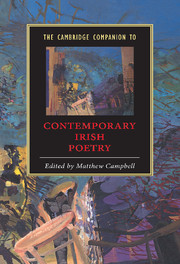Book contents
- Frontmatter
- 1 Ireland in poetry
- 2 From Irish mode to modernisation
- 3 Patrick Kavanagh and antipastoral
- 4 Louis MacNeice
- 5 The Irish modernists and their legacy
- 6 Poetry of the 1960s
- 7 Violence in Seamus Heaney's poetry
- 8 Mahon and Longley
- 9 Between two languages
- 10 Boland, McGuckian, Ni Chuilleanain and the body of the nation
- 11 Sonnets, centos and long lines
- 12 Performance and dissent
- 13 Irish poets and the world
- 14 Irish poetry into the twenty-first century
- Further reading
- Index
- Series List
5 - The Irish modernists and their legacy
Published online by Cambridge University Press: 28 May 2006
- Frontmatter
- 1 Ireland in poetry
- 2 From Irish mode to modernisation
- 3 Patrick Kavanagh and antipastoral
- 4 Louis MacNeice
- 5 The Irish modernists and their legacy
- 6 Poetry of the 1960s
- 7 Violence in Seamus Heaney's poetry
- 8 Mahon and Longley
- 9 Between two languages
- 10 Boland, McGuckian, Ni Chuilleanain and the body of the nation
- 11 Sonnets, centos and long lines
- 12 Performance and dissent
- 13 Irish poets and the world
- 14 Irish poetry into the twenty-first century
- Further reading
- Index
- Series List
Summary
Modernism and Ireland
ʿDublin Modernism? The term has a cheeky disregard of its absurdly obvious self-cancelling simplicityʾ (Hugh Maxton, The Puzzle Tree Ascendant)
Notwithstanding Joyceʾs representation of the Irish capital in Ulysses and Finnegans Wake, Dublin is not generally perceived as having been a vibrantly productive location of avant-garde experimentation, as were Paris, Berlin, London and New York. While the Irish Literary Revival is arguably a strand in the knotted skein of early modernism, in the eyes of writers as dissimilar as Thomas MacDonagh and Samuel Beckett its Celticism appeared remote from the dissonant tones and epistemological preoccupations of the historical avant-garde. In Literature in Ireland (1916), MacDonagh had proposed that it was not the Revivalʾs ʿCeltic Noteʾ, but poetry written in the ʿIrish Modeʾ - a style that preserved in English some of the sound-patterns of Gaelic verse - that was to some extent comparable in its disjunctive effects to Italian Futurism. In the light of this thesis, MacDonagh's translations might be profitably read alongside those of Ezra Pound - an admirer of Literature in Ireland - whose revolutionary ʿtranslationsʾ from Chinese poetry, Cathay, had appeared the year before MacDonaghʾs critical book. But MacDonaghʾs poetic and critical career was brutally truncated in 1916, when he was executed for his part in the Easter Rising; and it was to be in the poetry of his successor as lecturer in English at University College Dublin, Austin Clarke, that the Irish Mode was most rewardingly developed during the 1920s.
- Type
- Chapter
- Information
- The Cambridge Companion to Contemporary Irish Poetry , pp. 76 - 93Publisher: Cambridge University PressPrint publication year: 2003

